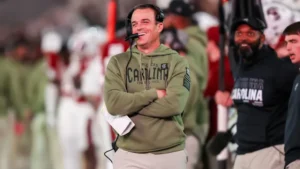
A Promising Career Cut Short: Former LSU Wide Receiver Kyren Lacy’s Life Ends in Tragedy After Police Chase in Houston
Kyren Lacy once dreamed of NFL glory. On the gridiron, he was a dynamic wide receiver with a 6-foot-2 frame and a penchant for making the tough catch in traffic. A product of Thibodaux, Louisiana, Lacy played with fire in his chest and LSU pride on his sleeve. But on a tragic night in Houston, that fire was extinguished in devastating fashion. The 24-year-old’s life came to an abrupt end following a high-speed police chase that has since raised more questions than answers.
Lacy’s final chapter began in the early morning hours of Sunday, when Houston police attempted to stop a vehicle suspected of speeding and reckless driving. Authorities say the driver, later confirmed to be Lacy, refused to pull over. What ensued was a chaotic pursuit through city streets, stretching across several miles before ending in a violent crash that killed Lacy at the scene. No other passengers were in the car. The investigation into the incident remains ongoing.
For many who followed his career, the news was both shocking and heartbreaking. Lacy had only recently stepped away from football, but few could have imagined such a grim ending for a young man who once seemed destined for greatness.
Kyren Lacy’s football journey began at Thibodaux High School, where he emerged as a talented and athletic receiver who drew interest from multiple programs. He signed with the University of Louisiana at Lafayette in 2019, where he immediately made an impact. In his redshirt freshman season, he tallied 364 yards and four touchdowns on 24 receptions. Lacy was raw but electric, and it didn’t take long for bigger programs to take notice.
He transferred to LSU in 2022, joining the Tigers at a time when the program was rebuilding under head coach Brian Kelly. In Baton Rouge, Lacy was seen as a complementary piece in a wide receiver room that boasted stars like Malik Nabers and Kayshon Boutte. Though his production was modest in purple and gold—he totaled 554 receiving yards and seven touchdowns over two seasons—he provided depth, veteran leadership, and occasional flashes of brilliance.
One of those flashes came in 2023 against Florida when Lacy reeled in a contested touchdown that helped seal a crucial win. After the game, Kelly praised his effort and maturity, calling him “a team-first guy who gives everything he’s got, every rep.”
Still, Lacy’s college career never fully bloomed into what some hoped it would. Injuries, inconsistency, and a crowded depth chart limited his opportunities. When he declared for the 2024 NFL Draft, scouts labeled him a fringe prospect—athletically gifted but technically raw. He went undrafted, though he was briefly invited to rookie minicamp with a team that ultimately chose to go in another direction.
That professional rejection seemed to spark a downward spiral.
According to those close to him, Lacy struggled with the transition out of football. Friends noted that he had grown more withdrawn in recent months. Social media posts were sporadic, cryptic even. One former teammate said Lacy had been “fighting demons” ever since his football dreams began slipping away.
“I think football was everything to him,” said a former LSU staff member who worked closely with Lacy. “And when that was gone, it left a void he didn’t know how to fill.”
Lacy’s family has yet to release a formal statement, but in a brief message posted to social media, his cousin described the tragedy as “a loss that words can’t explain.” LSU also issued a statement Sunday afternoon, expressing condolences to the Lacy family and calling Kyren “a Tiger forever.”
“Kyren brought spirit and energy to our locker room every day,” the statement read. “He will be missed dearly by his teammates, coaches, and the entire LSU community.”
As the LSU family mourns, the football world at large is left to grapple with the sad reality that some stories don’t end with redemption arcs or second chances. For every player who makes it to the NFL, there are dozens like Lacy—players with talent, heart, and potential, but also burdened by the pressure and identity crisis that can come when the game ends.
Stories like Lacy’s underline a painful truth in college and professional sports: athletes often aren’t equipped with the emotional and mental support they need when their careers end prematurely. While the NCAA has recently taken steps to improve mental health resources, many former players still slip through the cracks. Lacy’s untimely death should reignite conversations about what schools and athletic programs can do to support young men and women in transition—not just into sports, but out of them.
As the investigation continues, Houston police have not yet disclosed whether substances were involved in the crash or if any additional charges will be filed related to the pursuit. A toxicology report is pending. What remains clear, however, is that a young man who once thrilled fans with his acrobatic catches and boundless energy is now gone far too soon.
For those who knew him, Lacy was more than an athlete. He was a loyal friend, a family-first man, and a teammate who showed up even when his number wasn’t called. His coaches often spoke of his work ethic and positivity. He was the kind of player who would stay after practice to help freshmen learn the playbook, or who would send a text of encouragement to teammates going through a slump.
“He had this laugh that would make you smile even on the worst days,” said a former LSU teammate. “Even when things weren’t going his way, he tried to lift others up.”
It’s that version of Kyren Lacy that those who loved him are choosing to remember. Not the man behind the wheel in those final moments, but the one who stood tall in the end zone with the ball cradled in his arms, helmet off, smiling into the night sky. The one who made a city believe he might be the next big thing. The one who reminded us, even if briefly, of the joy that football can bring.
There will be calls for change. There will be retrospectives and tributes. But above all, there will be grief—raw and unrelenting—for a life that ended in chaos, and a soul lost to despair. The heartbreaking end to Kyren Lacy’s story is not just a personal tragedy. It’s a reflection of the pressures young athletes face in a world that sometimes forgets they’re human before they are heroes.
In death, perhaps Lacy’s legacy can be more than what the stat sheet showed. Perhaps it can be a wake-up call. Perhaps it can inspire others to reach out, to listen, to care. Because while we can’t rewrite the past, we can work to make sure that the next young man struggling after the game ends knows he’s not alone.
Kyren Lacy is gone, but he is not forgotten. Not in Thibodaux, not in Baton Rouge, and not in the hearts of those who watched him soar—if only for a moment.





